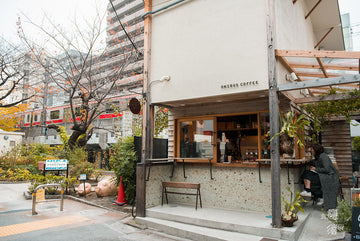ONIBUS COFFEE ETHIOPIA / Worka Sakaro
The Gedeo district in the eastern part of the Irgachev region is divided into six districts, one of which is the Gedov district. It is 434 kilometers away from the capital Addis Ababa. Until a few years ago, this was a remote area that took nearly eight hours to reach by car, but with the opening of the Ethiopia-Kenya road in 2016, the distance has been shortened to just three hours.
This is a region of Ethiopia with an environment suitable for coffee production, with a quarter of the land being grown in coffee. The Gedeb region is divided into 16 administrative districts, and Volka Sakaro is one of them.
Worka means "gold" in the local Gideo language. It is said that when the men of Haile Selassie, the last emperor of Ethiopia, visited the area, they were so impressed by the wealth of the people that they called the area "Woleka" (the land of gold). In addition, there is a huge tree in the area, which people affectionately call "Sakaro", and the name "Wolka Sakaro" is a combination of the two.
The land area is about 1,300 hectares, but more than half is grown in coffee, and there are 3 washing plants. In March 2017, one of them was owned by Ranger, a sister company of BNT (Ethiopian premium coffee exporter), and they had assembled excellent employees with comparable wages and were carefully carrying out the refining and drying process. In the photo, the company's employees are wearing green uniforms.
We have set out to produce higher quality Yirgachev coffee than ever before. (We also have two other washing factories in Gedeb in 2018)
Since the 2019 harvest, the Wolka-Sakaro cleaning plant has been owned by BNT subsidiary Ranger. Their goal is to create the best Irgachev ever. We employ talented employees at commensurate wages and carry out the refining and drying process carefully.
2018 was the first year that the cherry was fully ripe, overseen by 2016 WBC champion Wu Berg, and as the name suggests, it has been widely praised for its outstanding sweetness.
Production and processing:
1. The cherries harvested by small-scale farmers are transported to nearby cleaning plants or sales offices. Only mature cherries that meet special batch standards are put into the factory vat.
2. Use a MacKinnon disc pulper to peel the cherries, then use a stream of water to separate the parchment into P1, P2 and P3 (P1 is heavier and the highest grade).
3. Insert the parchment paper into the fermentation tank and ferment for about 36-48 hours.
4. When the surface slips and peels away from the parchment, rinse under running water.
5. After soaking for about half a day, drain the parchment and place it on an African bed to dry.
*To protect cherries, cover twice a day (when it’s sunny during the day and when it rains at night)
12:00 to 15:00 When the sun is strong, cover the parchment paper with plastic sheeting. This is to protect the parchment and prevent it from drying out too quickly. In addition to the high altitude, the region is right on the equator, so too much sunlight can damage the cherries and parchment, resulting in a cloudy flavor. Additionally, through slow drying (slow drying) for 12 to 15 days instead of the usual 8 days, the moisture in the coffee is evened out, creating a complex yet clean flavor. It is clear that progressive drying has a significant impact on the shelf life of green beans in consuming countries.
6. Dry for 12 to 15 days, stirring the parchment and removing imperfections.
7. After dry grinding in the threshing plant, the beans undergo purification and impurity removal, shelling, specific gravity sorting, and manual picking. The final refined green beans are packed into jute bags and exported.
- Taste: Apricot, honeydew melon, sugar cane, mellow taste
- Variety: Heirloom
- Process: Fully washed
- Country: Ethiopia
- Region: Gedeb, Gedeo zone, East of Yirgacheff
- Altitude: 2,050m
- Farm: Worka Sakaro Teddy Lot
- Roast: light roast
- Baking place: Japan
- Roasted date: November 8, 2024
- Material: 100% coffee beans
- Weight: 200g
Pickup currently unavailable

About ONIBUS COFFEE


